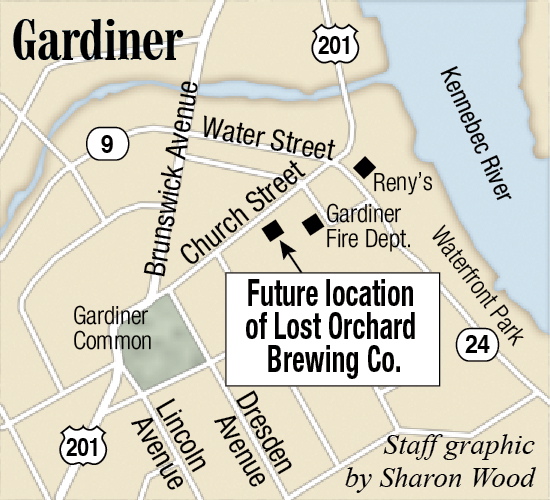The founder of a hard cider company opening in a former church in Gardiner still hopes to get bottles of his product on shelves by the end of the year after getting final city zoning approval earlier this week.
The city’s Planning Board unanimously approved a zoning exception at its meeting Tuesday for Lost Orchard Brewing Co. to open a hard cider brewery and tasting room at the former Gardiner Congregational Church on Church Street. The approval came three months after the board first reviewed the proposal and nearly a year after the company first targeted the century-old church building for its location.
The founder of the company, David Boucher, of New Harbor, said he first looked at the building last November as a potential site for the business. But before the business could be located there, the city had to create a process to allow the development to happen. City zoning rules prohibit nearly all commercial uses in the high-density residential district.
There was some resistance during public hearings over the last couple of months from a few residents of the area, but councilors ultimately approved the hard cider brewery’s plan last month using the new policy.
The approval allows the company to use three 1,000-gallon fermenting tanks and one finishing tank to produce up to 50,000 gallons of hard cider a year. If the company wants to grow, it could go through the process again to add up to three more fermenting tanks. If the company needs to grow beyond the six fermentation tanks, Boucher plans to eventually shift the majority of the operation to a warehouse building elsewhere in the city.
The company plans to use freshly pressed cider from the Maine Apple Co. in Monmouth and to bottle and package the hard cider on site. It also plans to open a tasting room in the former church sanctuary next year, hopefully for Memorial Day, Boucher said.
“If it comes out half as good as I have it in my mind, it’s going to be beautiful,” Boucher said of the tasting room. “It’s still going to very much have that look and feel the church did before, just a little different.”
As part of the project, the company is looking to restore the former church building, which was built in 1843 and last occupied in 2009. Boucher said the company will close on the property in the middle of November, and he expects the company to begin some minor necessary renovations immediately after that. The floor needs to be reinforced to hold the weight of the full tanks, he said.
Boucher said he has a distributor lined up to distribute bottles of the cider to stores and kegs of it to bars and restaurants across the state.
The first hard cider style released will be the company’s flagship recipe, which Boucher described as a farmhouse style with light carbonation. It will taste like freshly pressed cider from an orchard, but with a little taste of the alcohol, Boucher said.
“If you like apple cider, you’ll like this,” he said.
An update to the city’s comprehensive plan recently approved by councilors recommended finding creative uses for large, older buildings that weren’t built as homes but stand in residential neighborhoods, such as the former congregational church building.
The adaptive reuse overlay district policy approved by councilors in May allows the city to approve some commercial uses in these buildings in the high-density residential district. It can only be used for buildings that are at least 30 years old and that are no longer economically viable or physically suitable for uses allowed in the district. The policy only applies to buildings in the high-density residential district and for specific commercial uses, but city officials have said it could be expanded to other districts if it proves successful.
City Manager Scott Morelli called the ordinance a huge step in the right direction for Gardiner.
He said around 30 buildings in the city may fit the criteria of the reuse ordinance, and it creates the opportunity for new business and jobs and the possibility of adding properties to the city’s tax rolls.
Because the building was previously tax-exempt as a church, it may be the first time the city has collected tax on the property, Morelli said.
He said the city will look to tweak the process to streamline it because it took around three months for the hard cider company.
“I think overall this ordinance is going to serve Gardiner well,” Morelli said.
Paul Koenig — 621-5663
Twitter: @paul_koenig
Send questions/comments to the editors.



Success. Please wait for the page to reload. If the page does not reload within 5 seconds, please refresh the page.
Enter your email and password to access comments.
Hi, to comment on stories you must . This profile is in addition to your subscription and website login.
Already have a commenting profile? .
Invalid username/password.
Please check your email to confirm and complete your registration.
Only subscribers are eligible to post comments. Please subscribe or login first for digital access. Here’s why.
Use the form below to reset your password. When you've submitted your account email, we will send an email with a reset code.